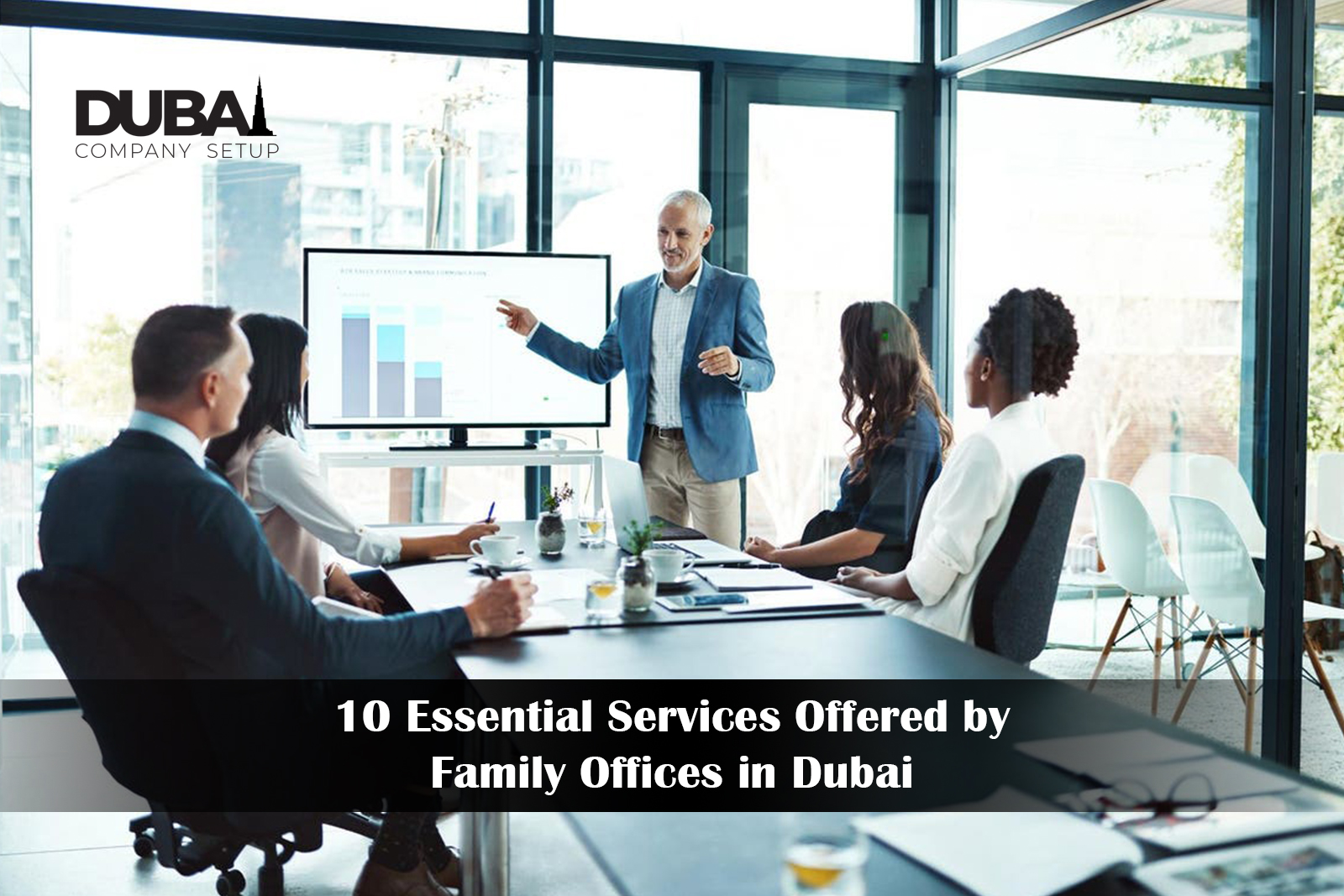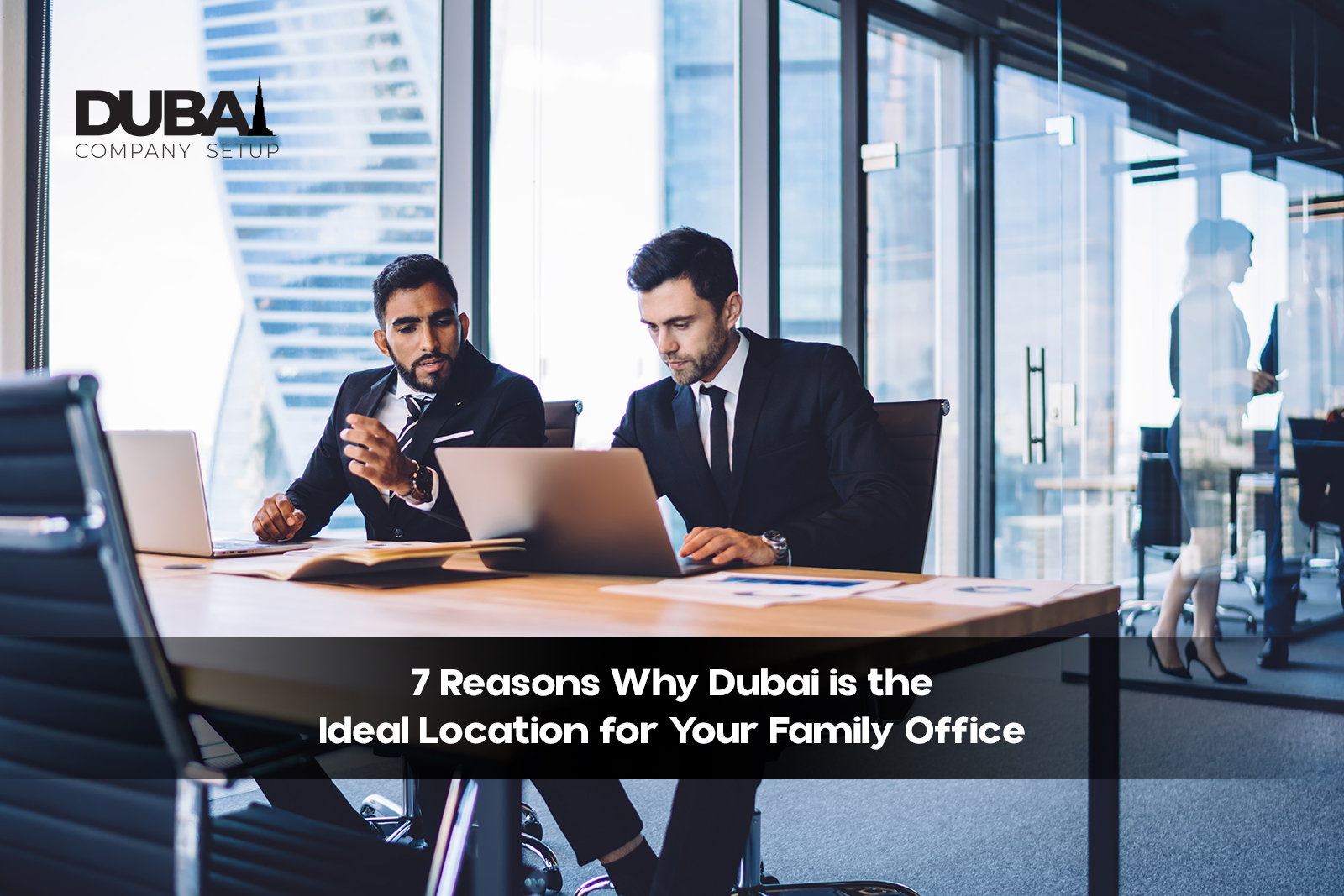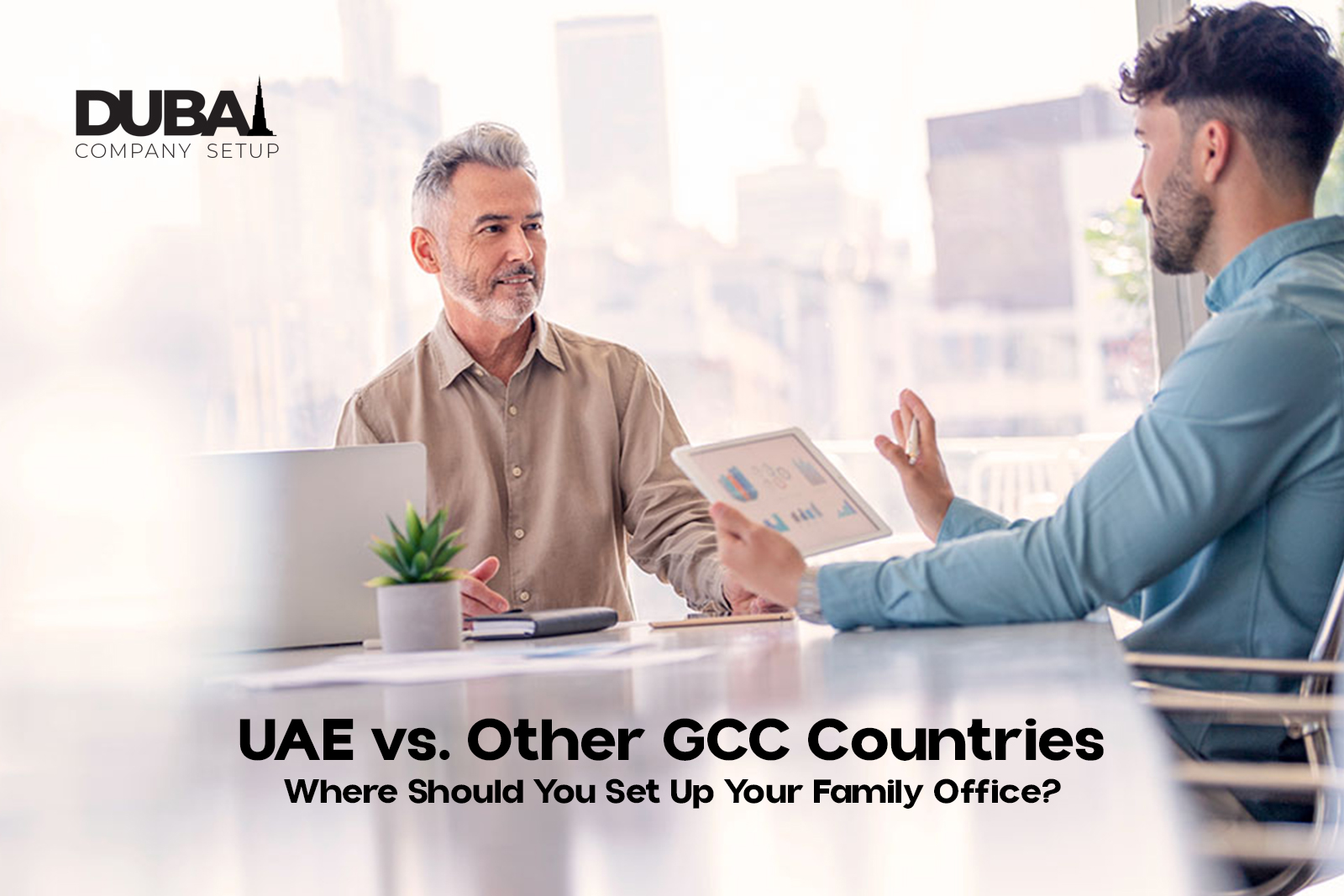When it comes to setting up a family office in the Middle East, the UAE family office setup vs GCC comparison is crucial. The UAE stands out as a prime location, but how does it compare to other GCC countries like Saudi Arabia, Qatar, Oman, and Kuwait? In this comprehensive guide, we’ll examine the key factors to consider when selecting the ideal GCC country for establishing a family office. We’ll explore the family office setup in the UAE vs Qatar, review regulatory environments, and compare business climates in a UAE vs GCC family office comparison, helping you make an informed decision about which GCC country for a family office is best for your needs.
What is a Family Office?
A family office is a private wealth management advisory firm that provides comprehensive financial services to ultra-high-net-worth families (UHNWIs). It typically manages investments, tax planning, estate planning, philanthropic activities, and other financial matters for one or more families. Family offices can be established in various jurisdictions, each offering distinct advantages. The GCC region, with its favourable tax policies, robust financial systems, and stable political environments, is increasingly becoming a hub for family offices in the Middle East.
The UAE as a Hub for Family Offices
The UAE, particularly Dubai and Abu Dhabi, is the leading destination in the GCC for family offices. Here’s why the UAE family office advantages vs GCC are so compelling:
1. Tax Benefits
The UAE traditionally had no corporate tax for most businesses. However, as of 2023, a 9% corporate tax was introduced for businesses with profits exceeding AED 375,000. This remains one of the lowest corporate tax rates in the GCC, especially compared to other countries like Saudi Arabia and Qatar. Personal income tax remains non-existent, which is a major advantage for family offices seeking to structure their wealth efficiently and reduce tax liabilities.
2. Business-Friendly Environment
The UAE’s business-friendly environment continues to make it a top choice for family offices. Zero per cent income tax, no capital gains tax, and minimal corporate tax make the UAE an attractive location for establishing and managing wealth. Additionally, Dubai and Abu Dhabi’s free zones provide significant benefits, such as 100% foreign ownership, no import/export duties, and easy company formation processes.
2. World-Class Financial Infrastructure
The UAE boasts a well-developed financial infrastructure, making it a hub for family office activities. The Dubai International Financial Centre (DIFC) and Abu Dhabi Global Market (ADGM) offer world-class financial services, a regulated investment environment, and access to global markets. These free zones are home to numerous international banks, wealth management firms, and investment advisors, making it easy for family offices to find the expertise they need.
3. Regulatory Environment
The UAE regulatory framework is another key advantage for family offices. The UAE has clear and well-established financial regulations, ensuring transparency and stability. Clear and well-established financial regulations ensure transparency and stability. In a family office regulatory comparison, GCC, the UAE, stands out for its alignment with international standards, which allows family offices to operate securely. Regulatory bodies such as the Securities and Commodities Authority (SCA) and the Central Bank of the UAE oversee financial operations and ensure compliance with international standards. Moreover, the UAE government is constantly improving its regulations to align with international norms, making it easier for family offices to operate securely and compliantly.
4. Strategic Location
The UAE’s strategic location between Europe, Asia, and Africa makes it an attractive base for family offices with global operations. Dubai International Airport and Port Jebel Ali, one of the largest ports in the world, provide exceptional connectivity for businesses looking to operate across the GCC and beyond.
5. Wealth Management Expertise
The UAE is home to some of the world’s leading wealth management firms, private banks, and financial advisors, offering expert advice tailored to the needs of UHNWIs. This expertise is invaluable for family offices, which often require specialised services in investment management, tax planning, estate planning, and asset protection.
6. Philanthropic Opportunities
The UAE has a growing culture of philanthropy, making it an attractive option for family offices that want to engage in charitable activities. The UAE government has made significant strides in promoting social responsibility, including initiatives that enable families to establish their own foundations or charitable trusts.
Saudi Arabia: The Emerging Market for Family Offices
When comparing a family office in the UAE vs Saudi Arabia, Saudi Arabia shows promise but has distinct differences. Here’s why:
1. Saudi Vision 2030
Saudi Arabia’s Vision 2030 is a transformative economic reform plan that seeks to reduce the country’s dependency on oil and diversify its economy. This ambitious plan has opened up numerous investment opportunities in sectors such as tourism, entertainment, renewable energy, and technology. For family offices looking to tap into the Saudi market, Vision 2030 offers a wealth of opportunities.
2. Regulatory Reforms
Saudi Arabia is actively reforming its regulatory framework to attract foreign investment and improve the business climate. The Saudi Arabian General Investment Authority (SAGIA) offers incentives such as full foreign ownership and a streamlined business registration process for family offices looking to establish operations in the Kingdom.
3. Wealth Management Industry
The wealth management industry in Saudi Arabia is growing rapidly, with a growing number of international and local banks offering wealth management services. However, the sector is not as developed as in the UAE, which means that family offices may face more challenges in terms of accessing specialised services.
4. Tax Considerations
Saudi Arabia does not impose a personal income tax, making it an attractive destination for family offices. However, it has introduced a corporate tax of 20% for foreign businesses, which may be a consideration for family offices looking to structure their wealth and investments efficiently.
5. Cultural and Legal Differences
Family offices in Saudi Arabia will need to be mindful of the cultural and legal differences compared to the UAE. Saudi Arabia has more restrictive social and business norms, and family offices may need to navigate complex Sharia law considerations in estate planning and business operations.
Qatar: A Stable and Secure Option for Family Offices
Considering a family office setup in the UAE vs Qatar, Qatar offers stability and tax efficiency: Here’s a breakdown:
1. Tax Benefits
Qatar’s tax environment is favourable for family offices. Personal income tax is not levied, and corporate tax is relatively low at 10% for foreign businesses. Additionally, there are no capital gains taxes or inheritance taxes, which is particularly beneficial for family offices looking to preserve wealth across generations.
2. Wealth Management and Financial Services
Qatar’s wealth management sector is well-developed, with numerous local and international banks offering a range of financial services. The Qatar Financial Centre (QFC) provides a robust legal and regulatory framework for family offices and financial services companies.
3. Regulatory Environment
The regulatory environment in Qatar is stable and transparent, with regulations that adhere to international standards. Family offices can benefit from Qatar’s clear and efficient legal system, which facilitates the easy structuring of investments and the management of wealth in a compliant manner.
4. Cultural Considerations
While Qatar is an attractive market for family offices, cultural norms and business etiquette may differ from those in the UAE. Family offices will need to be mindful of local customs and ensure they operate within the framework of Qatari law.
Oman: The Quiet Contender for Family Offices
For those weighing UAE vs Oman for a family office, Oman offers a simpler, discreet environment:
1. Low Corporate Taxes
Oman has relatively low corporate tax rates, at 15% for most companies. The absence of capital gains tax and inheritance tax also makes it an attractive option for family offices seeking a tax-efficient structure for their wealth.
2. Business-Friendly Reforms
Oman is currently undergoing economic diversification, with initiatives aimed at improving the business environment. The Oman Investment Authority is working to attract more foreign investments, making it easier for family offices to establish operations in the country.
3. Regulatory Environment
Oman’s regulatory environment is less complex than in some other GCC countries. The country is renowned for its political stability and straightforward regulations, making it an attractive option for family offices seeking a simpler path to establishing operations.
4. Small but Growing Wealth Management Sector
The wealth management industry in Oman is still in its early stages compared to the UAE or Qatar. However, there is increasing interest in private banking and wealth management services, making it an appealing location for family offices looking for a more discreet and less competitive environment.
Comparison of Family Office Setup: UAE vs. Other GCC Countries
| Criteria | UAE | Saudi Arabia | Qatar | Oman |
| Tax Benefits | 0% personal income tax, no capital gains tax, 9% corporate tax for profits above AED 375,000 | No personal income tax, 20% corporate tax | No personal income tax, 10% corporate tax | No personal income tax, 15% corporate tax |
| Regulatory Environment | Clear, well-established, modern | Reforms are in progress, but more complex | Stable, well-developed financial sector | Simple, stable, with growing reforms |
| Business Infrastructure | World-class financial hubs (DIFC, ADGM) | Growing opportunities under Vision 2030 | Growing but still developing | Small but growing wealth management industry |
| Political Stability | Very stable | Stable, but socially conservative | Highly stable | Stable with minimal political risk |
| Investment Opportunities | Highly diverse, strategic location | Vision 2030 offers many new sectors | High stability, low taxes for family offices | Focus on diversification and development |
Final Thoughts: Best GCC Country for Family Office
Deciding which GCC country for a family office depends on factors like taxes, regulatory frameworks, business infrastructure, and personal preferences. While each country has merits, the UAE clearly leads in a Middle East family office setup vs the GCC context. Its world-class infrastructure, business-friendly policies, zero personal income tax, and modern regulatory environment make it the most attractive destination.
Saudi Arabia offers promise under Vision 2030, Qatar provides stability and tax efficiency, and Oman offers simplicity and discretion. However, for family offices seeking access to global financial hubs, regulatory clarity, and unparalleled wealth management expertise, the UAE remains the best choice. For guidance on UAE family office setup vs GCC, family office in UAE vs Saudi Arabia, or family office setup in UAE vs Qatar, DubaiCompanySetup.info can help ensure a smooth and compliant setup experience.









